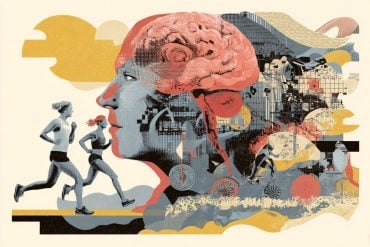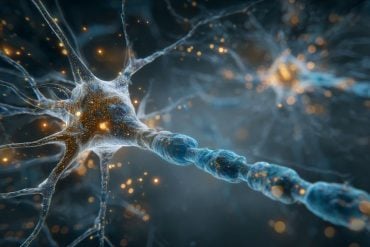Summary: Semaglutide, or Ozempic, a medication used for type 2 diabetes and obesity, may also be effective in treating alcohol dependence.
The drug reduced alcohol relapse drinking and overall alcohol intake in rats by more than half. Semaglutide acts on the GLP-1 receptor and is taken in tablet form once a week.
Clinical studies are needed to confirm the findings in humans, but the results offer promising insights into potential additional treatment options for alcohol dependence.
Key Facts:
- Semaglutide, a medication approved for diabetes and obesity, demonstrated significant reductions in alcohol consumption and relapses in alcohol-dependent rats.
- The medication acts on the brain’s reward system, particularly the nucleus accumbens area, potentially reducing the alcohol-induced reward.
- While further research is needed, the study suggests that semaglutide could be beneficial for individuals with both overweight and alcohol dependence.
Source: University of Gothenburg
The medication semaglutide, which is currently used in the treatment of type 2 diabetes and obesity, might also be an effective medication for alcohol dependence.
In a study from the University of Gothenburg, the drug reduced alcohol relapse drinking and alcohol intake in rats by more than half.
The results of the study are published in the scientific journal eBioMedicine.
Semaglutide is sold under brand names such as Ozempic. Since this medication has been approved for the treatment of obesity, demand has increased, which has resulted in difficulties in procuring the drug in recent times.

There is anecdotal evidence of patients with obesity or diabetes saying that their craving for alcohol has lessened since they started taking the drug.
Today, individuals with alcohol dependence are treated with a combination of various psychosocial methods and medications. Four approved medications are available. Since alcohol dependence is a disease with many causes, the efficacy of these medications varies, and so it is important to develop additional treatment medications.
Reduced relapses
Semaglutide is a long-acting substance that patients only need to take once a week. This is the first medication to act on the GLP-1 receptor that can be taken in tablet form.
In the study, alcohol-dependent rats were treated with semaglutide, which significantly reduced their alcohol consumption and even reduced the drinking of alcohol in conjunction with relapses.
Relapses comprise a major problem for individuals with alcohol dependence, as an individual who has abstained from alcohol for a period relapses and drinks more than before the withdrawal.
In the study, the treated rats cut their alcohol intake in half compared to animals that did not receive treatment. One interesting finding in the study was that semaglutide reduced alcohol intake equally in both male and female rats.
Animals and humans
The study reports a strikingly good effect, although clinical studies will be required before the medication can be used for alcohol dependence, and such studies take time. Moving forward, the medication may be of most benefit to patients suffering from both overweight and alcohol dependence.
According to the researchers it is likely that these results will carry over to humans, as results from other studies on alcohol dependency medications made with the same research model have shown similar effect in humans as in rats.
“There are, of course, differences in conducting studies on animals and humans, and these must always be taken into account. However, in this case, there is a previous study on humans in which an older version of the diabetes medications that act on GLP-1 was found to reduce alcohol intake in overweight individuals with alcohol dependence,” says Elisabet Jerlhag, professor of pharmacology at Sahlgrenska Academy at the University of Gothenburg.
Mechanisms in the brain
The current study also examined why the medication reduces alcohol drinking. The results indicate that reduced alcohol-induced reward could be a contributing factor. In the study, semaglutide affected the brain’s reward system in mice, to be more exact the nucleus accumbens area of the brain, which is part of the limbic system.
“Alcohol activates the brain’s reward system, resulting in the release of dopamine, something that is seen in both humans and animals. This process is blocked by the medication in mice, and with our interpretation, this could cause a reduction in the alcohol-induced reward,” says Cajsa Aranäs, doctoral student at Sahlgrenska Academy at the University of Gothenburg, who is responsible for much of the work behind the study presented here.
About this neuropharmacology research news
Author: Elisabet Jerlhag
Source: University of Gothenburg
Contact: Elisabet Jerlhag – University of Gothenburg
Image: The image is credited to Neuroscience News
Original Research: Open access.
“Semaglutide Reduces Alcohol Intake and Relapse-like Drinking in Male and Female Rats” by Elisabet Jerlhag et al. EBioMedicine
Abstract
Semaglutide Reduces Alcohol Intake and Relapse-like Drinking in Male and Female Rats
Background
Glucagon-like peptide1 receptor (GLP-1R) agonists have been found to reduce alcohol drinking in rodents and overweight patients with alcohol use disorder (AUD). However, the probability of low semaglutide doses, an agonist with higher potency and affinity for GLP-1R, to attenuate alcohol-related responses in rodents and the underlying neuronal mechanisms is unknown.
Methods
In the intermittent access model, we examined the ability of semaglutide to decrease alcohol intake and block relapse-like drinking, as well as imaging the binding of fluorescently marked semaglutide to nucleus accumbens (NAc) in both male and female rats. The suppressive effect of semaglutide on alcohol-induced locomotor stimulation and in vivo dopamine release in NAc was tested in male mice. We evaluated effect of semaglutide on the in vivo release of dopamine metabolites (DOPAC and HVA) and gene expression of enzymes metabolising dopamine (MAOA and COMT) in male mice.
Findings
In male and female rats, acute and repeated semaglutide administration reduced alcohol intake and prevented relapse-like drinking. Moreover, fluorescently labelled semaglutide was detected in NAc of alcohol-drinking male and female rats. Further, semaglutide attenuated the ability of alcohol to cause hyperlocomotion and to elevate dopamine in NAc in male mice. As further shown in male mice, semaglutide enhanced DOPAC and HVA in NAc when alcohol was onboard and increased the gene expression of COMT and MAOA.
Interpretation
Altogether, this indicates that semaglutide reduces alcohol drinking behaviours, possibly via a reduction in alcohol-induced reward and NAc dependent mechanisms. As semaglutide also decreased body weight of alcohol-drinking rats of both sexes, upcoming clinical studies should test the plausibility that semaglutide reduces alcohol intake and body weight in overweight AUD patients.
Funding
Swedish Research Council (2019-01676), LUA/ALF (723941) from the Sahlgrenska University Hospital and the Swedish brain foundation.






